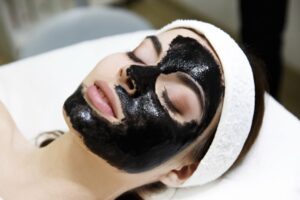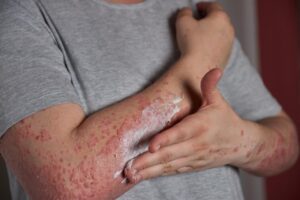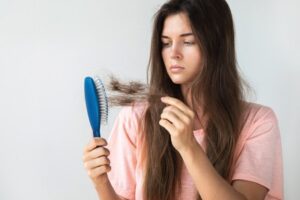
Are you noticing an increase in hair fall after recovering from COVID-19? Then you are not alone. This has become a common problem among the people who have recovered from COVID-19. But is it temporary or permanent?
While many people think of this as hair loss, it’s actually hair shedding. The medical name for this type of hair shedding is telogen effluvium. It happens when more hairs than normal enter the shedding (telogen) phase of the hair growth cycle. Fever or illness can force more hairs into the shedding phase. Due to the COVID-19 infection, there is not only physical stress but also mental stress too.
Following are few situations where Excessive hair shedding is common
- Lost 10kg of weight or more
- Given birth
- Experiencing lots of stress
- Had high fever
- Undergone an operation
- Recovering from an illness, especially if it included a
high fever
Stress can cause temporary hair shedding
Even if you never developed a fever or COVID-19, you may still see hair shedding. Emotional stress can also force more hairs than normal into the shedding phase. And who isn’t feeling more stressed and anxious during the pandemic?
Again, the hair shedding begins about two to three months after the stress starts.
Seeing your hair fall out in clumps can add to your stress, it’s important to try to de-stress. Only when the stress ends will the excessive hair shedding stop.
Hair tends to return to normal on its own
When the cause of your hair shedding is due to a fever, illness, or stress, hair tends to return to normal on its own. You just have to give it time. As your hair grows back, you’ll notice short hairs that are all the same length by your hairline. Most people see their hair regain its normal fullness within six to nine months.
If you suspect that your hair loss is caused by something more than telogen effluvium from stress or a fever, talk with a hair-loss expert, a dermatologist.
What can we do?
This hair shedding is reversible. so, stop stressing out which contributes to further hair shedding. Yoga and meditation can help you deal with stress.
Include a lot of protein, nutrients and micronutrients in your diet.
- Make sure you consume almonds, eggs, chicken, fish, tomatoes, green leafy vegetables, yoghurt, soybean and paneer.
- It is advisable to take supplements especially after having a viral infection. There are many hair growth supplements available in the market which contain amino acids, antioxidants and multivitamins.






